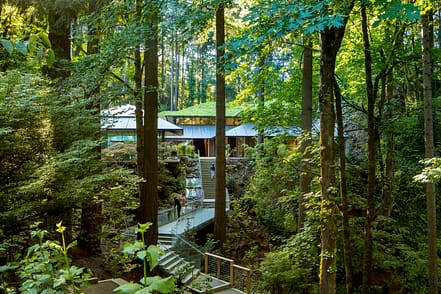
Portland Japanese Garden has been recognized by the American Society of Landscape Architects (ASLA) with the Award of Excellence for the Cultural Crossing Project. This is the highest honor of ASLA’s professional design awards program, where each year, submissions are made by the best in landscape architecture from around the globe.

The Cultural Crossing Project’s landscape architects, Walker Macy and Portland Japanese Garden, led by Garden Curator, Sadafumi Uchiyama, worked together within a highly collaborative, multicultural, and multidisciplinary team that included Kengo Kuma Associates, Hacker Architects, KPFF Consulting Engineers, Hoffman Construction, and a team of skilled landscape and gardening craftspeople. The Award of Excellence recognizes the project’s beautifully executed details; the team’s cohesive, place-based and landscape-led design approach; the interweaving of design excellence and technical problem-solving; and the team’s articulate balance between traditional Japanese and contemporary design and construction methodologies.

Portland Japanese Garden’s Cultural Crossing expanded the existing Garden, known as one of the most authentic outside Japan. The transformation created a rich, continuous visitor experience, from a more formal and inviting new entry that welcomed visitors at the base of the hill to a pedestrian path ascending through a forested ravine, culminating in the Cultural Village above. The design process for the Cultural Village took the immersive, contemplative experiences of its varied garden spaces and augmented them to offer a world-class setting for intercultural exchange and promotion of Japanese traditional arts and culture. Inspired by the forested, hilltop setting of the gardens, the Cultural Village emphasized strong indoor-outdoor relationships that created a feeling of permeability and interconnectedness, immersing visitors in the garden context with spaces that are adaptable for indoor-outdoor cultural events and classes.

The landscape architectural design solved significant geological, water management, forest quality, and accessibility problems, resulting in a resilient future for the Garden – all while preserving Japanese gardening and aesthetic principles. For example, to address geological challenges, a green infrastructure system was created through a stone creek bed, which runs from the top of the hillside all the way down to the parking lot, channeling and filtering water runoff down the hill into a nearly 27,000 gallon holding tank, where the water is slowly released into the city’s sewer system. The ephemeral journey of the water runoff parallels that of the entryway path, offering bridges to cross, and seamlessly connecting the entire site together with the element of water.
“As we planned the expansion of Portland Japanese Garden, we wanted to do so in a way that would continue to preserve it for the future – so that our community can continue to experience our Garden for generations to come.” said Sadafumi Uchiyama, Portland Japanese Garden’s Garden Curator. “Walker Macy and the extended team helped to make this a reality and the honor of the Award of Excellence recognizes their work and dedication.”
“The Portland Japanese Garden posed highly complex geological, environmental and site development challenges—and we were challenged to create a place that expands the definition of what a Japanese garden can be,” says Chelsea McCann, Principal Landscape Architect at Walker Macy. “The project’s success was made possible by our creative and collaborative architecture, engineering, and construction partners. With a shared vision of new garden spaces that seamlessly integrated buildings and the site, our process melded science and art to create a place of meaningful, immersive experiences. This project was truly a once-in-a-lifetime experience.”

